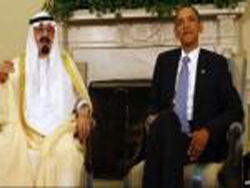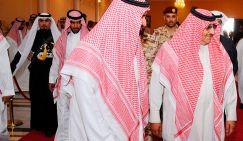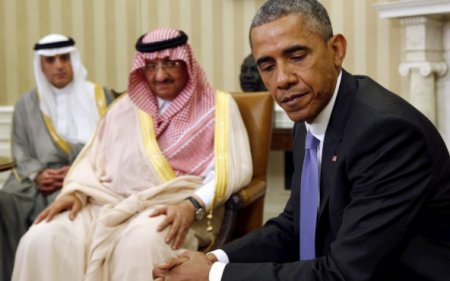
March 16 in the journal the Atlantic Magazine published an article by Jeffrey Goldberg entitled “Obama Doctrine”. The article is a montage of excerpts from conversations of the author with the President of the United States. Given that Goldberg included in the preferred journalistic, article, apparently, was agreed with the press office of the White house. For the first time made public statements of Obama’s, which contains not only harshly criticized Saudi Arabia, but also doubts about the advisability of further strategic partnership with the Saudis.
Until recently the strategic Alliance with Riyadh was one of the cornerstones of U.S. policy in the middle East. The relationship between the U.S. and Saudi Arabia was governed by a “Covenant Quincy”, concluded in 1945 between President Franklin Roosevelt and a founder of the modern Saudi state by king Abdul Aziz on Board the American cruiser “Quincy”.
“The Quincy Covenant” contained just two items: the U.S. guarantee the safety of Saudi Arabia, and the Saudi royals guarantees the energy security of the United States an uninterrupted supply of oil. On the territory of the Kingdom were placed by U.S. troops withdrawn from there in 2002.
In the 1960s, the common interests of Washington and Riyadh have increased considerably. The Americans got in the face of a CSA partner in the fight against Arab left nationalist movement, whose leader at the time was the President of Egypt Gamal Abdel Nasser. An even closer rapprochement between Riyadh and Washington occurred in the early 1980-ies on the basis of support of the Mujahideen organized to fight against Soviet troops in Afghanistan.
The Saudis helped Washington to strike at the Soviet economy by increasing the production of oil and knocking down the prices on the world market. With Saudi assistance, the U.S. has managed to achieve three important goals simultaneously: the weakened geopolitical position of the USSR, undermined the influence of left-wing Arab nationalists (the Baath and nasserist) and created a counterbalance to Iranian fundamentalists that came to power after the overthrow in Iran in 1979 the monarchy.
The Alliance was mutually beneficial: the Americans gave the green light to Saudi promotion of Sunni Islam in the most intolerant, sectarian version of Wahhabism. Thousands of mosques and madrassas built on Saudi money from Nigeria to Indonesia, have led to major changes in the religious doctrine of the Sunnis around the world.
A turning point in the strategic partnership the United States and Saudi Arabia was August 2013, when Obama refused to send American aircraft for bombing Syria, as urged Riyadh. One of the reasons for refusal was the unwillingness of the White house to become hostage to the interests of the family of Saud.
Recent statements by Obama, who is quoted by Jeffrey Goldberg, show the depth differences between Washington and Riyadh. In particular, the American President, noted that Saudi Arabia must learn to live in the region together with Iran and, moreover, to share with him the sphere of influence. This is definitely given to understand that Washington will not, as before, to cover Saudi Arabia in the event of a conflict with Iran and will not take an openly Pro-Saudi position.
Touched on Obama and the negative influence of Wahhabi Islam on stability in Asia. He remembered that in his childhood, when he lived in Indonesia, Islam in this country were peaceful. However, over time, with the spread of Wahhabi propaganda, Islam began to adopt a more belligerent look. “The Saudis and other Arabs from the Persian Gulf, said Obama, is flooded Indonesia with their money, teachers and preachers. In the 1990s, the Saudis actively funded Wahhabi madrassas and taught a fundamentalist version of Islam, which promotes the ruling family of Saudi Arabia”.
Jeffrey Goldberg writes that his direct question about whether Saudi Arabia is a US ally, the American President smiled and said: “it is complicated”. Monarchs of the Persian Gulf, Obama casually called “easy riders” (free riders).
Riyadh reacted immediately. Rebuke Obama gave Prince Turki al-Faisal. The son of king Faisal bin Abdul Aziz and brother of the late foreign Minister Saud al-Faisal, he for twelve years (1990-2002) was the head of Saudi intelligence, was then the Ambassador of Saudi Arabia in Washington and London.
The answer Turki al-Faisal Barack Obama sounded very emotional: “No, Mr. President, we are not “easy riders”. We initiated the meeting to fight DAYS, at these meetings was created the anti-terrorist coalition. We supply weapons and funding the Syrian freedom fighters, leading the war against the worst terrorist, Bashar al-Assad, as well as with DISH and “Dzhabhat EN-Nusra”. We only Finance the anti-terrorist center at the UN. We buy US Treasury bonds, with a small percentage of profit, and thereby help your economy. We give shelter to 30,000 American citizens and pay them in dollars for their knowledge and skills in business and in the economy. We send thousands of our students in your universities.”
Most Turki al-Faisal bothered by the fact that the US President likened the Saudi Kingdom, “which is associated with America 80-year-old ties of friendship” to Iran, whose leaders “never cease to call America a hostile country.” Bauchi the head of Saudi intelligence did not even mention all the good things the Saudis have supported America. They include, for example, buy huge quantities of American weapons illiquid that the Saudi army can neither serve nor to master. Only after the beginning of the Arab spring, Riyadh has signed with Washington contracts for purchase of arms by almost $ 60 billion, disbursing, essentially, a tribute to the military industrial complex of the USA
As can be seen, in Riyadh at 70 years of close relations with Washington did not understand the main thing: Americans have no permanent friends, only permanent interests. All former friends of Washington, devotees of the “quiet Americans” – Marcos, Suharto, Saddam Hussein, Mubarak felt it fully.
Faced with this on the background of the Syrian crisis, the Arabs cannot fail to mention another – loyalty to Russia its commitments. Close to the Saudi establishment, the General Director of TV company “al-Arabiya”, funded by the Royal family, Abdur-Rahman al-Rashed published in the newspaper “al-Sharq al-Awsat” his response to US President: “Obama’s Aversion to the Middle East can not be called politically wise. The Russians, who, since the kings dreaming of the exit to the warm seas, now they roam. All leaders of countries in the region over the past two years were forced to go to the Kremlin because of the intentional lack there of America. Now they have built with Russia strong and diverse relationships that did not previously exist”.
All speaks about the paradigm shift of the US policy in the middle East. The U.S. is not more dependent on oil supplies from the Persian Gulf, and the center of gravity of American politics shifted from the Middle East to the Asia-Pacific region, promising to make the twenty-first century U.S.-China rivalry.
Equally to show its strength at all points, the Americans already difficult, and they will gradually leave the Middle East, leaving other goods created by them, but not solved problems.
In the Arab world we increasingly hear the voices of those who appreciates this fact. Renowned Arab journalist, the editor of the newspaper “Rai al-Yawm” Abdelbari Atwan writes: “America is tired of Arabs and their naughty antics and is looking for more predictable allies in Southeast Asia and Africa. In our opinion, this is highly beneficial for the Middle East, which will return to its own efforts. The region will strive for tolerance and cooperation instead to go into military adventures. They will be forced to diversify their economy, to strive for social harmony and happiness around him.”








